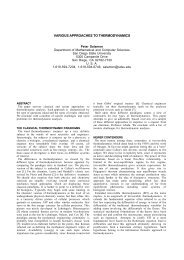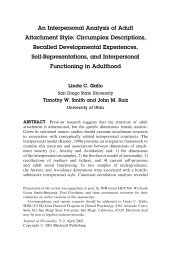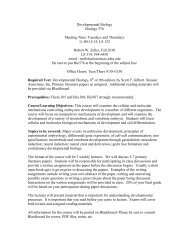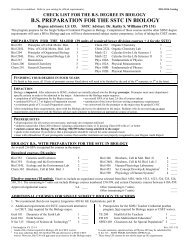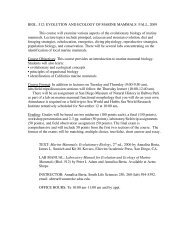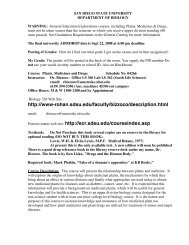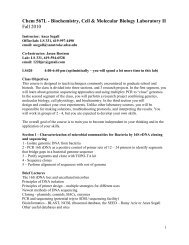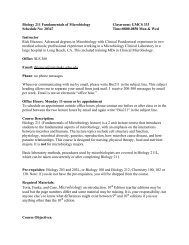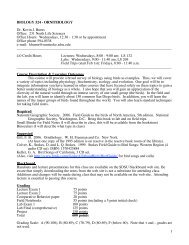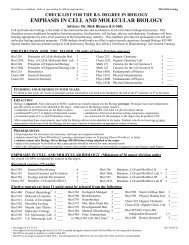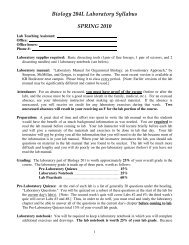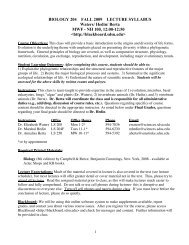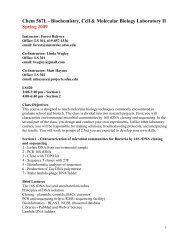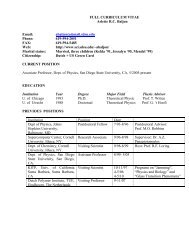sciences review web 2003 - The College of Sciences - SDSU
sciences review web 2003 - The College of Sciences - SDSU
sciences review web 2003 - The College of Sciences - SDSU
Create successful ePaper yourself
Turn your PDF publications into a flip-book with our unique Google optimized e-Paper software.
Chemistry<br />
Department Chair: Dr. Carl Carrano<br />
Computer Science<br />
Department Chair: Dr. Leland Beck<br />
Participants in a wireless conference from <strong>SDSU</strong>s “VisLab” to the Anza-Borrego Desert<br />
<strong>The</strong> <strong>College</strong> <strong>of</strong> <strong>Sciences</strong> is pleased to announce the formation <strong>of</strong> the newest<br />
department—Computer Science. Leland Beck is the chair and there are many<br />
exciting developments within this department.<br />
Monica Neuburger, Ph.D. (Former <strong>SDSU</strong> Student )<br />
<strong>The</strong> Department <strong>of</strong> Chemistry welcomes their new chair, Carl Carrano, who<br />
joined the department this spring from Southwest Texas State University.<br />
<strong>The</strong>re he served as department chair from 1988 to 2000. Carrano received his B.S.<br />
with honors at UCSB and his Ph.D. from Texas A&M University. He has published<br />
extensively in the field <strong>of</strong> bioinorganic chemistry, is the author <strong>of</strong> over 125<br />
research publications and the North American editor for the International Journal<br />
<strong>of</strong> “BioMetals”. His emphasis is inorganic chemistry and his interests include<br />
metalloproteins, zinc and vanadium chemistry and biochemistry, as well as iron<br />
transport and storage. <strong>The</strong> department looks forward to Carrano’s leadership.<br />
Chemistry also welcomes their newest faculty member, Gillian Roehrig. Gillian<br />
arrived in the fall from the University <strong>of</strong> Arizona where she obtained her Ph.D.<br />
as well as providing undergraduate instruction. Gillian’s emphasis is in Chemical<br />
Education and her research interests are focused on issues related to the<br />
implementation <strong>of</strong> inquiry-based instruction in both secondary and undergraduate<br />
classrooms. She is currently working closely with San Diego City Schools on<br />
evaluation related to a chemistry curriculum for all 10th grade students, as well<br />
as teacher development in both chemistry content and inquiry-based pedagogy.<br />
Andy Cooksy and John Love were Principal Investigators this year on a $140,000<br />
instrumentation grant to purchase a computer cluster for computational science<br />
research. <strong>The</strong> cluster will be used to study the impact <strong>of</strong> molecular structure<br />
on fundamental chemical processes in combustion, interstellar chemistry and<br />
biochemistry. It will be administered by the Computational Science Research Center<br />
and will be available to researchers throughout the <strong>College</strong> <strong>of</strong> <strong>Sciences</strong>. Faculty in<br />
Astronomy, Physics, Biology and Mathematics also contributed to the proposal.<br />
A sincere thank you goes out to John Woodson from all <strong>of</strong> the <strong>College</strong> <strong>of</strong> <strong>Sciences</strong><br />
for his dedication and hard work over the past forty-two years. Woodson’s<br />
participation in the Faculty Early Retirement Program is coming to an end in May.<br />
We wish him the best <strong>of</strong> luck in his future endeavors.<br />
A community service-learning program was initiated in the fall <strong>of</strong> 2002. Through<br />
this program, CS students earn three units <strong>of</strong> credit while providing s<strong>of</strong>tware<br />
engineering services for a not-for-pr<strong>of</strong>it organization. Organizations supported<br />
this year include the City Heights Community Technology Center (chartered to<br />
bring technology and internet access to an extremely diversified low income<br />
neighborhood), the Cancer Clinical Services Quality Assurance Project within the<br />
<strong>SDSU</strong> Graduate School <strong>of</strong> Public Health and a debt counseling organization that<br />
<strong>of</strong>fers credit counseling services to help consumers break free from debt. Students<br />
set up computer system administration procedures, implement databases to<br />
support business objectives, automate reporting requirements and set up <strong>web</strong><br />
pages to help the organizations reach their target audiences.<br />
Robotic person following is the newest project developed at the Intelligent<br />
Machines and Systems (IMS) laboratory directed by Mahmoud Tarokh. This project<br />
builds on previous research projects <strong>of</strong> the IMS lab that included the development<br />
<strong>of</strong> intelligent navigation and control <strong>of</strong> Rocky 7 Mars rover for NASA and a genetic<br />
algorithm based path planner sponsored by Lockheed-Martin. <strong>The</strong> robotic person<br />
follower uses an on-board camera to acquire images <strong>of</strong> the person and directs the<br />
robot to follow the person using a fuzzy logic based intelligent controller. It can<br />
recognize the person being followed and avoids collision with walls, tables, chairs<br />
and other obstacles. When fully developed, this type <strong>of</strong> intelligent robot can carry<br />
tools and equipment, provide vital information and assist with rescue operations.<br />
More information about this and other projects <strong>of</strong> IMS lab can be obtained by<br />
visiting the lab <strong>web</strong> page www-rohan.sdsu/~tarokh/lab/.<br />
Accelerating globalization <strong>of</strong> the world economy has led to increasing interest and<br />
activity in s<strong>of</strong>tware internationalization - methods for accurately and efficiently<br />
translating s<strong>of</strong>tware developed for one culture and/or language into other cultures<br />
and languages. <strong>The</strong> first foray into s<strong>of</strong>tware internationalization – translation<br />
<strong>of</strong> Academic Systems Corporation’s mathematics courseware from English into<br />
Spanish – was successfully completed in fall 2002. Currently there are negotiations<br />
underway with international universities and corporations to establish a variety <strong>of</strong><br />
collaborative programs and certifications in s<strong>of</strong>tware internationalization.<br />
Faramarz Valafar leads the Bioinformatics, Medical Informatics, and<br />
Cheminformatics research group. <strong>The</strong>se fields encompass the application <strong>of</strong><br />
mathematical and computer scientific techniques in biological, medical, and<br />
chemical <strong>sciences</strong>. Valafar’s research also includes high performance computing<br />
in the form <strong>of</strong> parallel and distributed processing, especially for biological, medical,<br />
and chemical applications.



